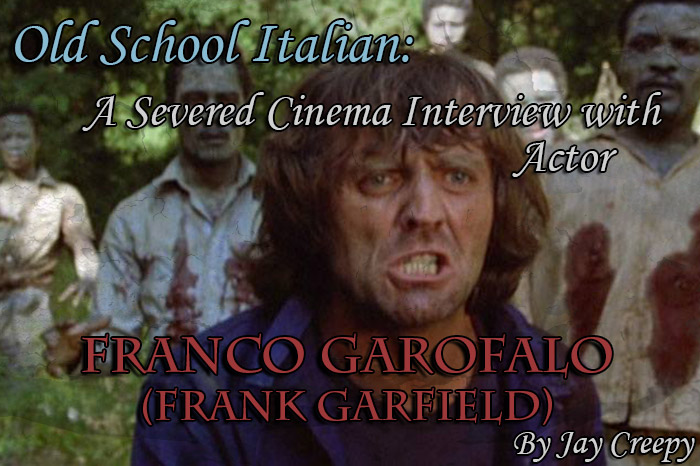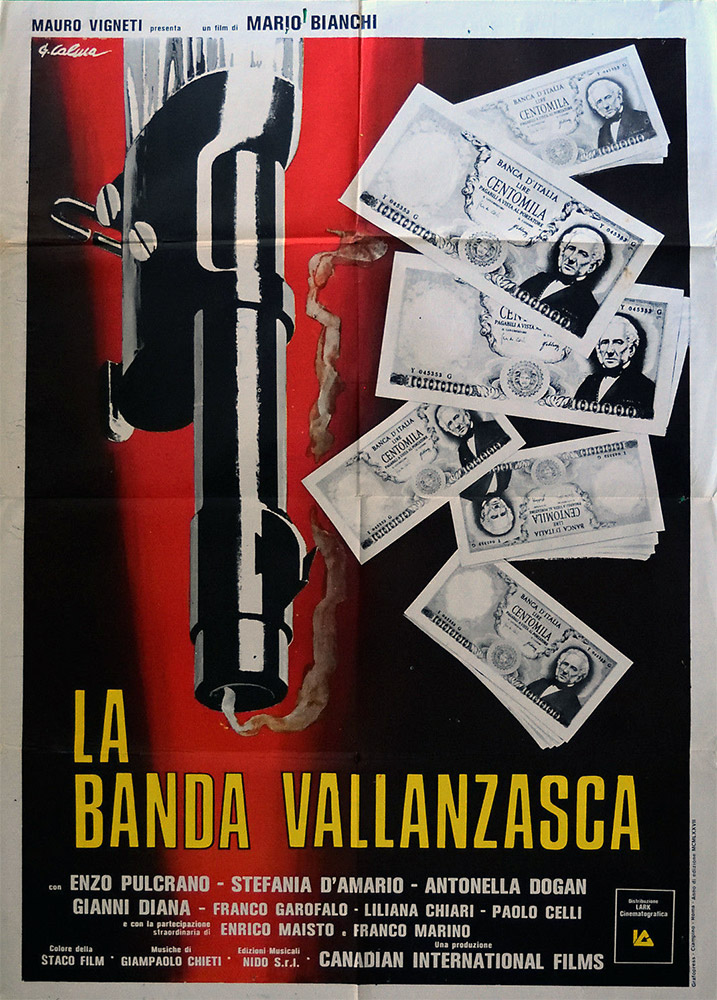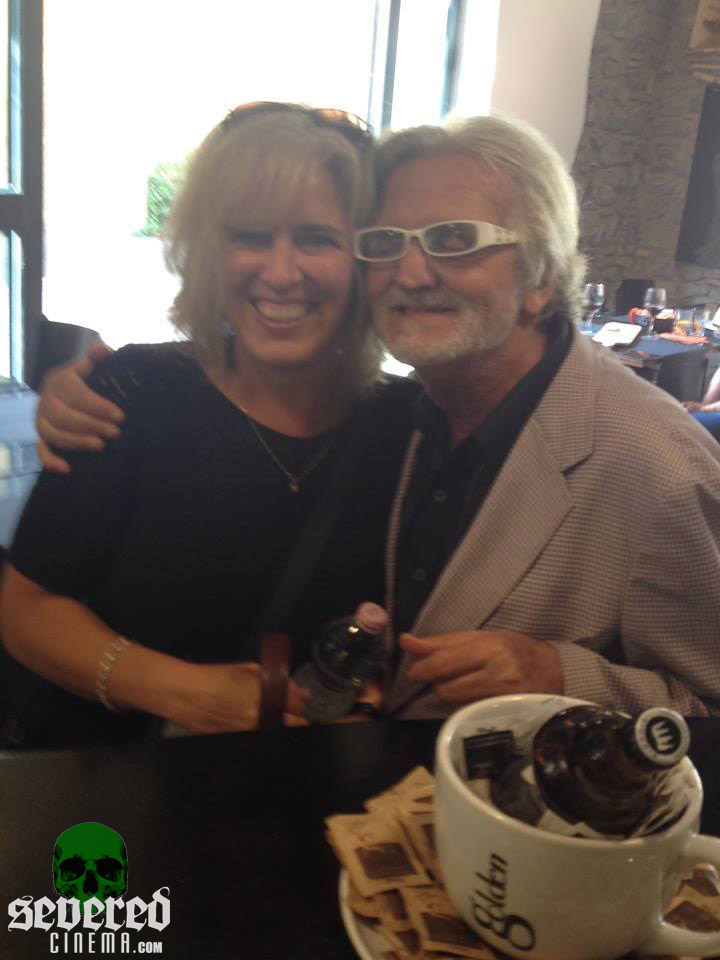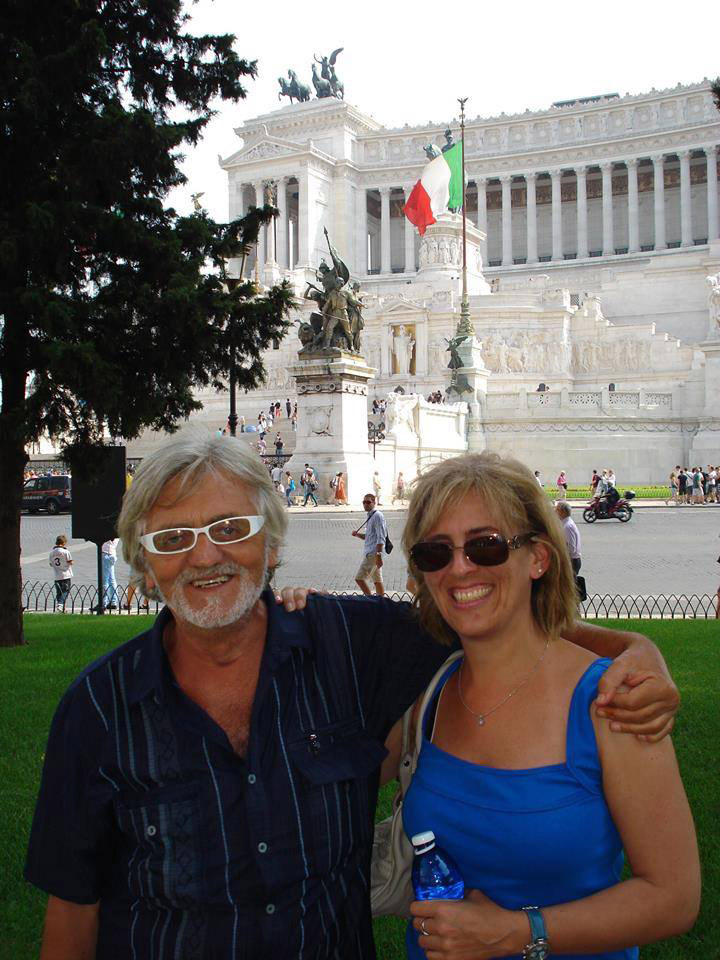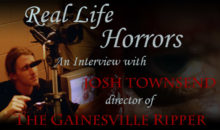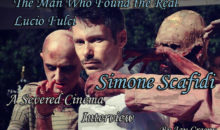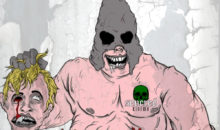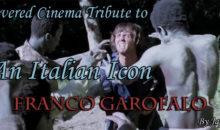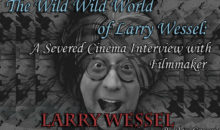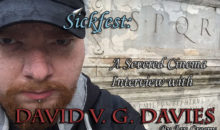Old School Italian: A Severed Cinema Interview with Actor Franco Garofalo
As a fan of the horror genre, there are certain emotions and a sense of wonder you get when you revisit childhood movies. I was seven years old when my parents used to hire out large box tapes with films which were soon to be caught up in the infamous Video Nasty witch hunt. A few years later, my Dad’s friend loaned us uncut movies for a while. One such movie was Zombie Creeping Flesh, aka Hell of the Living Dead.
As an impressionable youngster, already besotted with Dawn of the Dead, Zombie Flesh Eaters and The Beyond, I was enthralled. I found myself rooting for the slightly unhinged character, Zantoro, played with zeal by a chap called Frank Garfield. Years later, the actor cropped up in a few more films I watched, Eyes Behind the Stars and The Other Hell. He always appears rather sweaty, wide-eyed and ready to snap at any moment.
So, fast forward so many decades from watching Zombie Creeping Flesh, and I approached the actor himself, Franco Garofalo (Frank Garfield) for an interview. I expected to be turned down, to be honest, since months prior, another Italian actor totally blanked me (even blocked me on Facebook). Mr. Franco Garofalo, however, obliged and I am happy to say, he is a friendly and fantastic person who has endured many ups and downs.
Wherein for my interviews I am usually rather cheeky, I found myself facing a man who I consider horror royalty. This chap lived through the era of Italian Cinema which spawned, it felt like, thousands of classic genre movies. Franco has dealt with possession, wars, zombies, aliens, criminals, and so much more. Therefore it is an honour and a privilege to speak with Zantoro himself.
(Please note, I was translating everything and sometimes the translating service has jumbled sentences slightly. I have altered one or two things to flow, but have also wished to keep everything to its original text as best I could. My apologies for any moments which may have to be re-read twice.)
Greetings my friend. I must start by saying it is a pleasure to be interviewing you. Some of your roles were responsible in the making of me when I began watching horror films at the age of seven. My parents loved horror but made sure I only saw the more fantastic fantasy films, such as zombies, possessions, that sort of thing. So first off a big thank you for participating in this.
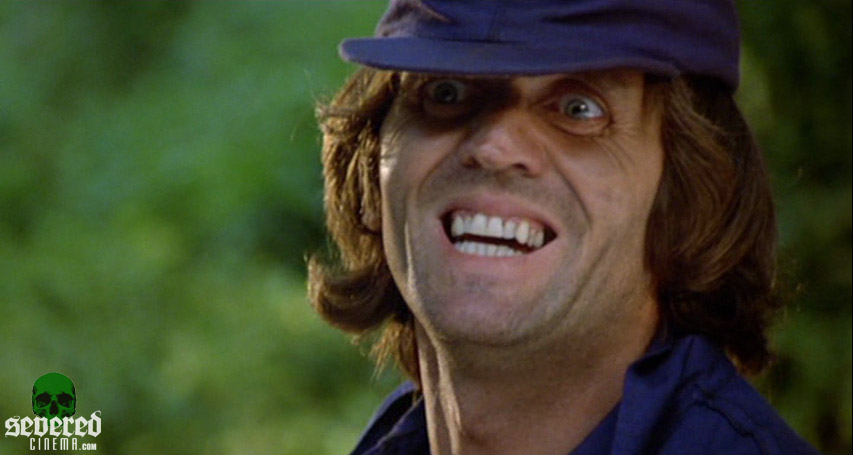
The pleasure is mutual.
From a first hand ground zero perspective, what was it like to be part of the Italian boom and do you ever look back with fondness at your films and the memories they gave you?
I ceased to be an actor giving up big occasions like “In the Name of the Rose” television dramas etcetera. I was going through a deep depressive crisis and I have moved away from all that as my world. I ended up living even under the bridges in the street like a bum. Only a few years, since the Italian television called me to dedicate a special Stracult in the program. I knew I was part of the actors Cult Italian film of the seventies. I enjoyed it but I have many regrets.
I am totally stunned by what you just said? You lived under bridges in the street? If you don’t mind, could you explain further?
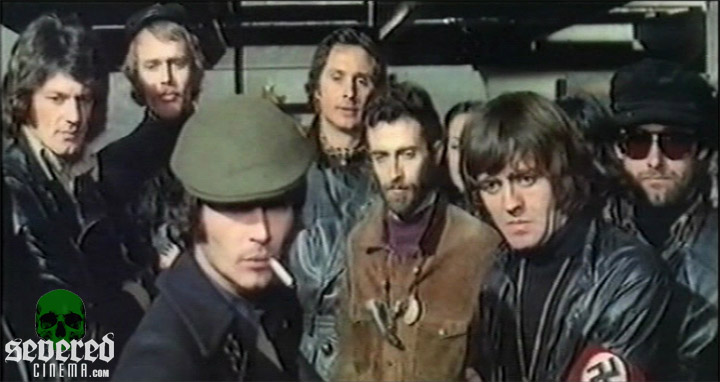
I was no longer the same as before, and I was overcome by a malaise that prevented me from finding stimuli to continue to be an actor and not only lost interest in anything, even to life itself and ended up on the street, where I was struck by a heart attack and a severe form of kidney failure. Four years were spent in temporary accommodation centers along with former prisoners, alcoholics and toxic with whom relations were not always idyllic and night also happened to have to sleep with one eye open. I was not a subject tamed and to assert the rights of the other guests of those centers, exposing myself beyond measure with the staff from which I suffered conducted openly unfair. But they understood that I was not stupid, and they respected me to the extent that they feared that they could create problems with the department. When transmitting my interview on Rai two Stracult I was still inside and found them all, the staff to the guests, asked me how I had done with my past end up in shelters. I think I’ve earned on the field the right to be an actor and support my family with peace of mind. I did not get rich with this profession, to me the money I have ever tickled that much; but at least the opportunity to keep my family close without being forced to move to England when difficulties burdened menacingly over our lives. This country makes the injustice his banner. I ended up on the street where I lost my dignity and my pride in pitiful conditions. And when I read or see interviews with directors with whom I worked that describe me as an actor of great potential and I could be a character among the best in Italy, it still gnaws more ass, ugly bastards, for letting all these fine hopes die with me.
As a fan watching your works, and never knowing what goes on behind the scenes, I have to wonder how hard it was to find work in the Italian industry then after all you have just said. Obviously there was a flood of films dedicated to so many various genres, but did you find yourself typecast? Did it help if this was the case?
In Italy the “meritocracy” exists. Many Italian actors who have no talent, they came quickly to the success because they have the “Saints in Paradise.” They were and are recommended by political friends or relatives. In the seventies, the communist party had invented myths to many modern directors for the actors, also supported by critics complacent. I have always disgusted the recommendation and the merit was mine alone and I’m proud. If I had not I given up for my choice because I was bad, today I would have done extraordinary things without being recommended.
To add on, in your opinion, what happened to the Italian industry? A handful of books have discussed theories and probably facts. However you, my friend, were there on the battlefield. When did it start — the decline of the films and their output?
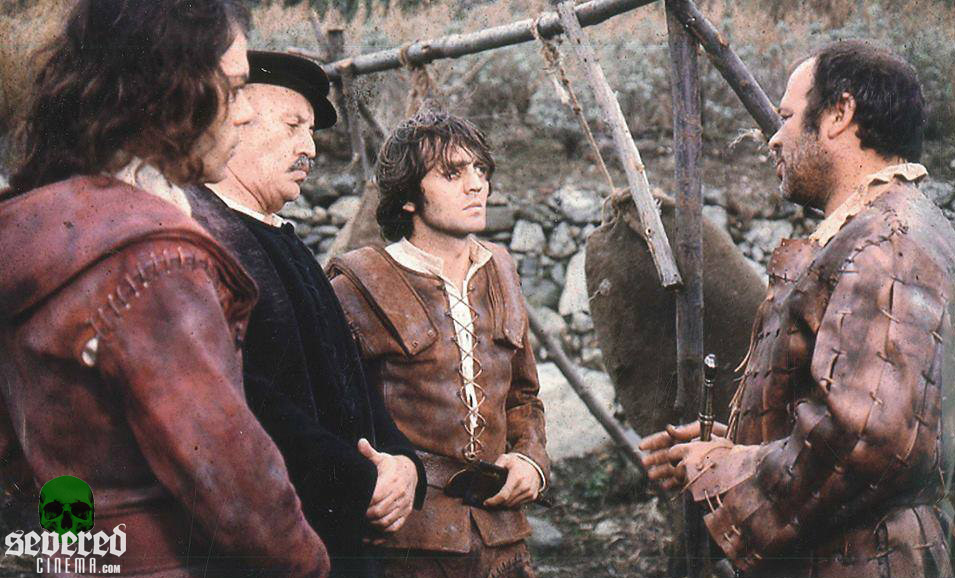
I too have published a book called “REVENGE OF AN ACTOR SCHIZOPHRENIC.” One of my autobiographies that my Italian fans have asked me (to do). The causes of this decline in my opinion are to be found with the advent of technology. I realized a movie where I did everything alone and without money and that has had critics and audiences at various festivals where my film was shown. This film has a testamentary value when I stopped being an actor because I was sick and was also screened for three months to film Silvano Agosti, the Azzurro Scipioni in Rome,and was screened Tiber Island in Rome to ‘INTERNATIONAL FILM FESTIVAL, and I represented Italy and it is a great satisfaction for me because the film required a great commitment of technical and economic resources that I had not, but I still managed to make it happen. The title is Schizophrenia of an Actor. The video also on my Facebook Page.
You’ve shared credits (not always scenes) with the likes of Pam Grier, Klaus Kinski, Tomas Milian and many more. To many cult film fans this will place you in a certain royalty. Tell me, do you ever attend conventions and meet the fans?
They asked me to attend a conference in Australia with my fans but I have the plane terror. For the same reason I lost other film opportunities in America, directed by Aristide Massaccesi where even we signed the contract, but at the last moment I did not have the courage to embark on the plane. Even in the Philippines with Bruno Mattei and Claudio Fragasso I had to give up. I worked with Klaus Kinski in the Heroes in Hell movie directed by Aristide Massaccesi. The Arena (Ghosts of Gladiatrici) was directed by Steve Carver, an American director. Then I did Origins of the Mafia, where there was a very large cast with American actors Lee Jee Cobb, my father did Joseph Cotten and many others…
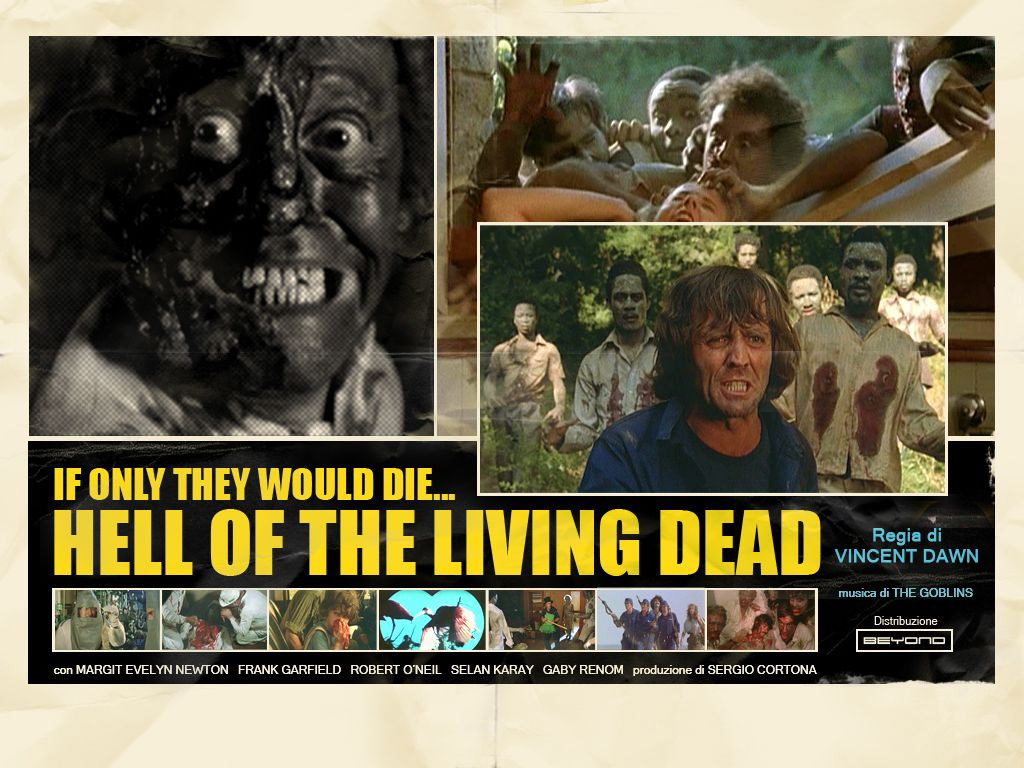
With the exception of some titles such as Zombie Creeping Flesh/Hell of the Living Dead, Eyes Behind the Stars, Scorpion with Two Tails, Guardian of Hell/The Other Hell and one or two more, your films are so hard to obtain on disc or tape (I’m very old school, I rarely download you see). Taking the whole of your career, which films do you consider your best and the ones which represent your talents against a good script, etcetera?
We say that all the directors I’ve worked with knew that my main qualities as an actor was the “versatility” in the sense that I liked to feature the character physically and psychologically, where even my voice was changing. But mostly I improvised in front of the camera and they remained stunned. As the mad scientist in Virus (Zombie Creeping Flesh), the psychopath in La banda Vallanzasca and the priest Don Arrigone in La vera storia della monaca di Monza (The True Story of the Nun of Monza), in major bookstores in Italy, such as the Feltrinelli, still have my DVD movies produced by Nocturno. I believe that the origins of the Mafia was also productive at all levels as a whole the most important, but the missed opportunities in films only for bad luck, those will remain etched in my memory. Then if we have other opportunities to hear, I’ll explain what happened. Here it would be too long to tell.
I will definitely be looking at a second interview some time soon. So many legendary directors and writers have passed you by throughout your work. Whom do you reckon are or were the greatest in terms of understanding their crews and cast?
No doubt my most important experience is with the great Federico Fellini and here you need to tell what happened — MY GREAT REGRET! The meeting with the Master for Casanova film allowed me for the first time in my life in a real way to perceive the significance of genius. In various interviews that have made me, for reasons of time, I could not tell this my extraordinary experience. Before signing the contract, within one year, Fellini wanted to repeatedly meet at Cinecittà. When he told me he was working without a script I understood the meaning of these frequent meetings, during which, happened something unique and extraordinary. I was to project on the screen of his mind my character with the corresponding sequences each time we met. In summary, his method was to put the player in the position to inspire his creativity and writing, not a text, but images of the character that he was mounting in the head even before you turn them and sometimes drew on a piece of paper he had before him on the desk. And that was a huge advantage for an actor who had only to bring to life a character already built on its strings. Many know how it ended, this was my big chance. For the first time in my career as an actor I signed two contracts at the same time because it coincided dates. I finished the film Casanova by Fellini, Saturday and Sunday, and on Monday I was leaving for Torino in the filming of Colt 38 Special Squad by Massimo Dallamano. But the unexpected I had not calculated. My character in Fellini’s Casanova was a Prussian officer who inside the castle of Wodembrok, defied Russian roulette with other officials. We were only five actors who settled the teacher in front of large bodies from the first day of manufacture, the rest were all extras which Fellini had devoted himself until two days after the expiration of my contract as those of the other actors. I think he was granted stay within, but my fear was that he could consume all my character devoting himself only to me in one day and I would have lost money in the Dallamano film in Turin. A necessary choice at the time because I also had a family to support. I had no choice, I left bitterly that character’s extraordinary that we would live in a surreal atmosphere, and regretted it.
With hundreds of actors, actresses, directors, and so on, have you kept in touch with many? If so, which names do you consider as friends?
Some few of them are no longer as poor Maurizio Merli with whom I met a few times to play football.
Has your life slowed down at all? What is a typical day in the life of Franco Garofalo, aka Frank Garfield?
Dirigo — basic courses in acting for people who live in places where there are no schools to attend, as the Islands and the Italian provinces and this is a unique initiative on the web. In this case the Italian television wanted to interview me. But the most important task now that I have time, I dedicate to the study of “Neuroscience” with a good knowledge I have acquired in the past on the psychology that helped me in building the characters that I interpreted as an actor.
I couldn’t help but notice that on your Facebook page you speak a lot about the politics in your home country. What are your views on the man who has just taken power?
He voted for a referendum on this government, but I do not have a good opinion of the Italian people, I do not consider him very intelligent and there is a lot of ignorance.
Away from the man we see on the screen, who is Franco Garofalo? Who is his family and his friends? Who does he hold dearest to him in life
The most important person in my life is my daughter! She was born in Naples just before moving to Rome. She looked like a little angel — blond with blue eyes, never a whim for a request. Expressing her joy with a smile. I swore to myself she would not have to spend even one day of her childhood as I lived mine. Despite the psychological difficulties that I met in the process of identification with the father figure, after the critical experience I lived with, I think I was a father a little sui generis, but always protecting it with such tenderness, I think I was to her a playmate. Pretty fun. Definitely I did not follow the traditional rules of the father figure. almost always absent in the dialogue with their children. Some errors I committed them, especially when I was hurt, but the love never missing.
SOLIDARITY! My thought with examples of solidarity for unfortunate people that I brought home where she already understood little the meaning of that gesture. A guy I met on the train, without a ticket, trembled, and did not know what to say to the train crew who asked him to present the ticket. I suspected a schizophrenia beginning, a case which also involved risks in taking him home with a child and a wife. But my instinct was right. He stayed at my house for several months and was able to find a good room also thinking about his future. I believe that to improve the generations to come, in all families, instead of closing in their selfishness, it would be useful to bequeath to our children, in addition to money for those who have them, even solidarity towards those who suffer if we want to improve this society behind other countries in the more civilized world of ours. The garden of my house in Rome became a place of attendance among people in the neighborhood as diametrically opposed mentality, education, culture, politics, social difference etcetera… It became a kind of laboratory where experienced resetting of the differences and any prejudice against the other. The frequenters of the group was made by a former fascist who lost a war footing, two trans, and foreigners of all colors and languages. There were those who had been in jail or had mental problems. His evenings were spent in the name of harmony and mutual respect. The two trans wanted a lot of good to my daughter and to his birthday, always preparing a beautiful cake. They felt a part of our family and we loved him. When we moved to England they were crying like children. That indescribable emotions when you feel the soul vibrating like the strings of a violin. These stories or experiences have taught me to understand many things and also I delivered to my daughter.
Also, please tell me some things about your childhood and key things in your life, other than your films.
Aged six years (1951), I stropicciavo the face black with carbon paper, carbonless one, which was used once to get in the car, to look like Othello The tent bed of my father served as a curtain, from which I came out for exclaiming emphatically “Desdemona.” The carbon paper solution in the absence of make-up to look like Othello, to the age of six, when there was no television, were unmistakable signs of “vocation” of an actor. Also I imitated gaits and the physical characteristics of all acquaintances. And at school, in elementary school, always they chose me to recite the poems. My family was well-off, a rarity in the post-war period in Naples. I, as a child, was attending the best schools of Naples. My father was a lawyer and a person from the human point of view was extraordinary. Then suddenly he fell ill when I was still small, I still needed him! The atmosphere in our house forever changed our habits. No more parties! Every corner of our house was full of oxygen cylinders from which my father inhaled air that kept him alive. When he went to the bathroom and was overcome by vertigo, he was accompanied by me using my shoulder for support. A giant of a six-three, led by a six year old child, and not vice versa as it would be fair that was. Denied a childhood, I lived in the house in a ghost company, and when I turned eleven, for the first time in my life, I saw a man die. My father!
I so felt that deeply, my friend. I lost five members of my family including my Father all within one year, but I was an adult. I cannot imagine the pain which existed in that part of your life. I’m sorry if I have resurrected these feelings, my friend. I am going to change the interview so far off subject now because one thing I haven’t asked yet is this; are you a horror fan? If so do you feel that the genre has gone too far since the more gentle days of the so-called Video Nasties? In fact, what were your own thoughts on the scare tactics of the Video Nasties craze which hit the united Kingdom in the early part of the 80s?
But see, I feel you cannot label a category. I believe that there are good and bad horror movies and this applies to all kinds. Of course I love the suspense in films of any kind, including the comedy, the audience does not predict what happens next, especially for what concerns the end of a film. I liked Dario Argento.
Leading on from your tastes in films, you tended to portray a twitching unhinged kind of personality in some of your movies. How did you relax after a days filming? Was music part of the easing down? If so, what kind of music do you listen to?
(Laughs) Nice, this thing you said. But I have never experienced the problem, you only had a night out with some beautiful actresses, my partners, in the film to relax.
Thank you again for this interview. It’s been absolutely marvellous speaking with an actor who lived and worked through such a fantastic era of horror films.
Thanks to you all for the effort of having to translate my answers and for the respect that you have shown to have in me. In the future if you come to Italy, you will be made to feel welcome. We will know each other in person. Goodbye, Friend.
Interview with Franco Garofalo was conducted by Severed Cinema writer Jay Creepy. His Facebook Page can be found here.


